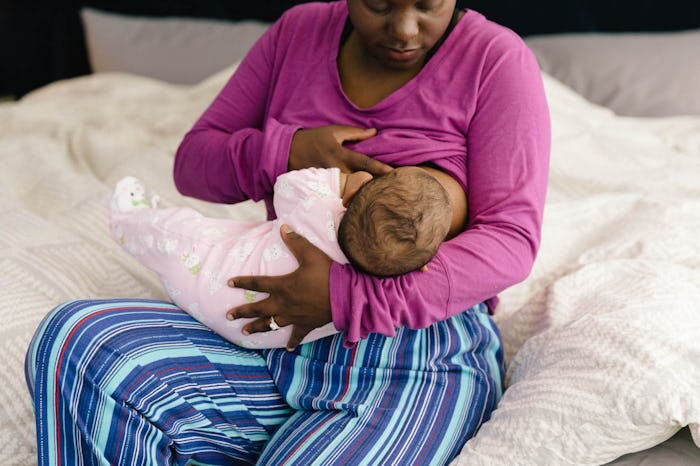Breast or bottle? It's one of the most difficult decisions many mothers make when they have a baby. While breastfeeding works for some, it doesn't work for everyone for a number of reasons. Some prefer not to breastfeed as a choice, while others might find that choice taken out of their hands. Either way, the decision to feed your baby by breast or bottle can be emotionally fraught. Which is why this question — are mothers who breastfeed more "maternal?" — asked by a recent study is riddled with complications.
The study, which was conducted over a decade by Boise State University, looked at whether there could be a correlation between mothers who breastfeed and an "increased maternal sensitivity," according to Global News. The researchers, whose work was published on Monday in the American Psychological Association, looked at 1,272 families living in 10 cities in the United States for 10 years, according to Global News. Through a series of videos and questionnaires, researchers looked at the way mothers interacted with their children (infants to 11 years of age) during free-play scenarios and problem-solving tasks. And according to Dr. Jennifer Weaver, lead author of the study and an associate professor at Boise State University, the data offered surprising results. Weaver told The Daily Mail:
It was surprising to us that breastfeeding duration predicted change over time in maternal sensitivity. We had prior research suggesting a link between breastfeeding and early maternal sensitivity, but nothing to indicate that we would continue to see effects of breastfeeding significantly beyond the period when breastfeeding had ended.
So first questions first here; how exactly did researchers come to define "maternal sensitivity?" According to Science Daily, their definition was:
... the synchronous timing of a mother's responsiveness to her child, her emotional tone, her flexibility in her behavior and her ability to read her child's cues.
In other words, researchers videotaped mothers interacting with their child in their homes periodically over a 10-year period, and then researchers rated the moms on their responsiveness to their children: how they support their child, respect their autonomy, their emotional tone, and their ability to read their child's cues. Around 74.4 percent of mothers involved in the study reported that they breastfed their child, with the average length of breastfeeding just slightly less than 17 weeks. Researchers found that "mothers who persisted in breastfeeding for a longer duration increased their maternal sensitivity over time," according to Pacific Standard. They also noted that motherhood is "complex," and that breastfeeding is one of many factors that can affect they way mothers bond with their children.
While the study did find that increased breastfeeding led to a stronger maternal sensitivity, Weaver told Science Daily that the increase was actually quite small. She went on to note that breastfeeding is one of many ways a mother can bond with her child.
The study is not intended to diminish the bonding experiences of women who are not able to breastfeed. Ultimately, I do hope that we will see breastfeeding examined more closely as a parenting factor, not just as a health consideration, to allow us to more fully understand the role that breastfeeding plays in family life.
Breastfeeding has proven to have a myriad of health benefits for both mother and child, including a decreased risk of contracting a virus, helping the uterus contract, and reduced risk of breast and ovarian cancers.
And, as Dr. Weaver noted, it could help mothers connect with their babies and increase their "maternal sensitivity" (which could be considered highly subjective, at any rate). But it's important for mothers to remember that breastfeeding is only one of many ways to bond with your baby. Skin-on-skin contact while feeding or cradling, eye-to-eye contact, and even simply talking to your baby are just some of the many ways to bond, according to Kids Health.
It's important to remember there are many ways to be a parent. And your comfort level is integral to the process.
Watch Romper's new video series, Romper's Doula Diaries:
Check out the entire Romper's Doula Diaries series and other videos on Facebook and the Bustle app across Apple TV, Roku, and Amazon Fire TV.
